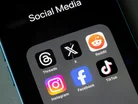TikTok's Role in Healthcare: Safeguarding to Misinformation

The video-sharing app TikTok is being sued by seven families in France, who accuse the social media giant of exposing their children to harmful content - leading two to take their own lives.
The case alleges the video platform's algorithm exposed them to content promoting self-harm, eating disorders and suicide.
TikTok faces scrutiny over safeguarding and healthcare misinformation
TikTok, which is one of the world's most popular social media platforms, said it had not received any notifications of legal proceedings relating to the claims. The company added that its community guidelines do not allow for the showing, promoting or sharing plans for suicide or self-harm. While the platform uses a combination of technology and moderation to ensure these standards are upheld, TikTok has faced criticism over its safeguarding practices, which has led to some bans and partial restrictions of the platform across the world.
But TikTok is just the latest modern technology to experience a run-in with parents who have concerns for their children's health and wellbeing. From irreverent novels to violent comic books, rock and roll music to video games, previous generations have all experienced a divide between what children want and what parents think is the best option for their child’s overall health and wellbeing.
Yet these parents' fears have had little impact on the app. Zhang Yiming, a Chinese tech entrepreneur and the founder of ByteDance, the parent company of TikTok, has claimed the top spot as China's wealthiest individual. With a net worth of US$49.3bn, this is largely attributed to TikTok's extraordinary success during and after the COVID-19 pandemic.
Despite stepping down from his leadership role at ByteDance in 2021, Zhang reportedly retains approximately 20% ownership of the company.
The presence of videos showing suicide and self-harm on TikTok is not the only problem on the platform. Over the pandemic, The World Health Organization partnered with TikTok to combat health misinformation.
"By working with TikTok and others, we are helping people access credible information and engage in scientific discourse that collectively helps shape a healthier future for all," shared Dr. Jeremy Farrar, WHO Chief Scientist.
Researchers from University of Arizona College of Medicine have called for TikTok to step up their efforts and conducted a study on medical misinformation on the platform.
"It's clear that more needs to be done to flag misinformation on TikTok, including doctors becoming more heavily represented on the platform to combat misinformation with accurate, science-based information," said Dr. Macklin Loveland, the study's lead author.
Healthcare workers' who use TikTok must balance creativity with professionalism
However, the healthcare sector is also monitoring the TikTok posts of its workers, after a series of inappropriate posts were published by staff seeking to embrace their video creativity after a shift.
At the Dau Kalyan Singh PG Institute and Research Centre in Raipur in India, nurses were sacked for creating a dance video while inside the operating theatre.
Nurses have also been fired from Emory University Hospital Midtown in Atlanta for listing their ‘icks’ about maternity patients.
“We are aware of a TikTok video that included disrespectful and unprofessional comments about maternity patients at Emory University Hospital Midtown,” a statement from the hospital read. “We have investigated the situation and taken appropriate actions with the former employees responsible for the video. Every patient at Emory Healthcare deserves to be cared for by a compassionate, experienced team in a comfortable and safe environment.”
However, some hospitals have unclear guidelines on social media postings, while others feel that stressed healthcare workers should be able to have fun and dance, or vent their frustrations.
"These are real people with real emotions and real passions and in order for them to take care of their patients, they need to take care of themselves,” said Jordyn Amoroso, Chief Brand Officer at Clove. “If social media is an outlet in which they are able to do so, that should absolutely be supported."
Make sure you check out the latest industry news and insights at Healthcare Digital and also sign up to our global conference series - Healthcare LIVE 2025
Healthcare Digital is a BizClik brand




